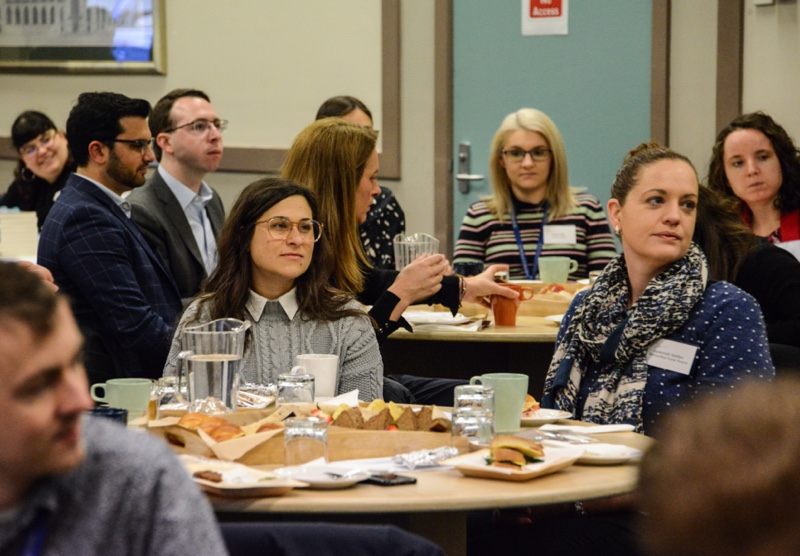Treasurer Tim Pallas’ Budget speech to VCOSS Members entitled Putting Patients First, had all the hallmarks of the conscientious or ‘professionally pessimistic’ Treasurer (to use his terms), especially after two years of combatting Covid-19. Many excellent initiatives have been funded for social service provision – and a number of our members’ work has been recognized with funding provision. This is great to see. Together, Government, social services and the Church and wider community can work to make sure that those who are most impacted, vulnerable and disadvantaged can have a better go of it. At the same time, it felt as though some of the reformist edge of last year’s budget had gone as the general positive narrative of recovery from pandemic and unemployment (which we critique in our recently released report) was prominent and claimed.
This year’s state budget could have been far worse for social services, and there was some observations from the sector that it was better than any news from the recent Federal Government Budget. However, long-term reform and investment in prevention have nonetheless played second fiddle to economic repair and efficiencies, and will likely do so for several years. Despite a stress on ‘shared values’, the implied caveat was on economic realism ‘in an ideal world’. Fiscal challenges are thus likely for social service practitioners, the state’s ‘fastest growing job sector’, in the near future. These remarks were of concern to CSSV, as we work to ensure a person-centred approach to the work of charity and justice.
Economist Angela Jackson’s speaks of the ‘Health Overhang’ present in Victoria even before Covid-19, from when demand for services became elevated. The additional $12 billion for health is to maintain services and meet extra demand, partly because of an ageing population. There has been over 30 years of increasing chronic disease across the community is one of the challenges Victoria faces. A stronger reform emphasis on prevention – of social issues and public health issues – is needed.
The title of this year’s Budget Putting Patients First shows the emphasis and immediate focus on health, without as much long-term social imagination or close examination of the state’s future wellbeing. The economic and social effects of the pandemic and world’s longest lockdown have previously been emphasized (see CSSV’s collaborative report with ACU and SMHW on Scarring effects of the pandemic economy: COVID-19’s ongoing impact on jobs, insecurity and social services in Victoria for more on this). As VCOSS CEO Emma King said, we should not put ‘patients’ first, stressing clinical crisis, to be met by more expensive and unavailable experts, but rather ‘people’ first, across the life-span, from the significantly impacted mental health of young people to the physical decline of the aged. Here the community, aided and equipped by social service agencies, have a key role. Our understanding of a 2.6% indexation for social services funding is a real win for the sector — but when inflation is at 5.1% as the Treasurer states, this remains a huge area of challenge to finance response to need. Mr Pallas does not want this to be at the expense of community welfare, but how could it not be?
Partnership, person-centred and holistic approaches are the right way forward. Some glimmers of hope were seen in the Government’s grant to the Good Samaritan Inn, who had already secured provision of Church land within the Archdiocese of Melbourne, for creating a new women’s refuge worth and for adequate staffing and care. This collaboration of a professional Catholic agency, the Government and the Church-at-large is what is so often needed to meet the needs of our communities.
Some specific standout points from the Budget, and rhetoric surrounding its release:
$2.5m in funding has been allocated towards improving the quality of care received by ageing prisoners, as well as to offer specialist transition and reintegration assistance. This funding comes after substantial CSSV advocacy during 2021, and our research report’s recommendation for more rigorous processes of care within the justice system to better meet the care needs of ageing prisoner (including adequate provision of personal care attendants to aged and disabled prisoners). Respect for the dignity of all people means that prisoners’ health and wellbeing needs are holistically met while they are incarcerated. However welcome this funding is, the Budget neglects the opportunities that a rigorous prisoner-caregiving program could allow for prisoners, and there remains no detailed commitment to developing an aged care facility for prisoners. As outlined in our 2020 Prisoner-caregiving Program: Supporting Older Prisoners report, younger prisoners giving care to ageing offenders within a resourced program can be mutually beneficial in ensuring that care is adequately maintained, while providing intrinsic benefits for the prisoner-caregiver.
- The $12 billion spend on healthcare is the feature headline of this budget.
- Focus was on the bounce back and apparently low headline unemployment numbers of Victoria, and a seeming underestimation of the ongoing struggle of social services and their clients, old and many new — who are still situated in response mode, rather than recovery.
- Optimism regarding headline unemployment and other indicators should be balanced with the reality of a current tripling of people on a JobActive caseload compared with pre-pandemic levels in early 2020. Our services assist a much larger proportion of people on woefully inadequate JobSeeker payments (205,000 people on unemployment related welfare in March 2022 in Victoria – some 125,000 more than pre-pandemic).
- Many, including refugees, asylum seekers, international students, still have very little means of support, outside of charity. Up to 20% are under-employed and large numbers are uncounted
- The rhetoric around this Budget puts stress on ‘investment’ and the Government’s desire to see that money spent has long-term benefits. This puts great pressure on agencies to demonstrate efficiency and complex evaluation while simultaneously actually doing the work of prevention – all whilst still maintaining crisis response. This needs to be understood and further resourced by Government.
- Mr Pallas also desires demonstrable efficiencies within the sector, as indexation is built into forward estimates for the next four years. The critique of this is that methodology for this indexation was/is opaque and that social services already run so lean and utilize so much unpaid labour through volunteers. A discussion about ‘efficiency’ is an additional burden to already stretched services, as noted in the CSSV 2019-20 budget submission, even before the COVID-cataclysm and its continuing effects or ‘scarring’. As Mr Pallas noted in an aside, we still need to remain in a pandemic ready state in future.
- Economist David Hayward argued that though pleased overall with Pallas’ less draconian cuts at this stage, he made the comment that any market competition frame-work does not work well for energy markets nor the care economy, especially with the needs for wage increases to keep up with currently 5.1% inflation. He illustrated the problems from the stock market’s currently strongest investments being in child-care buildings, yet this does not prioritise the children or current shortages of staff. Angela Jackson showed more confidence in markets but sees a need to set up the care economy to deliver for the entire economy. This does not recognise that carers are often precluded from working.
- Critical for the care economy is the assurance of long-term focus and certainty. While the Productivity Commission recommends up to seven year contracts on economic efficiency grounds, social services are predominantly working with only one year funding arrangements. This leads to great uncertainty, lack of long-term thinking, and this is a barrier to attracting the best and brightest to work in social services. For the fastest growing industry in Victoria, there is then a need for Treasury to clearly communicate their goals and commit to long term work, so the sector can respond fittingly and efficiently.
Spending Highlights in CSSV Priority Issues and Areas of Interest/Advocacy
Domestic Violence:
- $241m spend overall including:
- $69m (over 4 years, $26.4m in 2022-23) to continue funding for refuges; including building new refuges, upgrading existing facilities, and buying new crisis accommodation facilities. This includes specific funding for Good Samaritan Inn’s excellent work.
- $30m perpetrator intervention, i.e. behavioural change programs (including building an evidence base of what works)
- $43.4m (over 3 years, $19.5m in 2022-23) for family violence services including crisis case management, counselling and financial support
Mental Health:
- $3.8b in reforms announced last year
- $1.3b further to continue to implement recommendations from the royal commission
Indexation:
- Public servants have indexation of 1.5% this coming year
- 90 million put aside for committed indexation for the community sector funding over the coming 4 years. Our understanding is that this equates to 2.6% for this year, up from 2% last year.
Regional Victoria:
- $2m for encouraging regional community services workforce
- $5m for scholarships for community sector (future) workforce
- $12m for Horsham – business development
Homelessness to Home:
- Victorian Budget revealed funding to From Homelessness to a Home (H2H) program has been reduced by $43 million annually, 78% of its earlier budget which translates to 1,440 people missing out on support.
- $75m will go to homeless support, $9.4m to continue homelessness programs
Young People, Homelessness and Criminal Justice:
- $1.2m for the Empower Youth Program to continue
- The Navigator Program funding continued – $37m over forward estimates
- $2.5m for care for aged prisoners
This year’s Budget includes a visible emphasis on early intervention strategies. CSSV have maintained an active commitment to promoting these approaches to social issues as principle. This Budget provides $504m in investment via 16 initiatives linked to the Early Intervention Investment Framework (EIIF) and builds on last year’s funding of $324m for ten initiatives that intervene early and direct demand away from acute services. This framework intends to closely track programs’ success in delivering longer-term specific outcomes and avoided costs across government.
Support for existing social investment partnerships with members VincentCare and Sacred Heart Mission continues — SHM’s Journey to Social Inclusion (J2SI) PAD was named last year as an example of a successful early intervention program within this new EIIF. However, Jenny Smith from Homelessness Victoria noted the massive decline in support for the successful H2H program which kept many off the streets and in safer housing contexts from the onset of the pandemic.
Further, in line with the emphasis of our 2022-23 Budget paper and submission to the Criminal Justice Inquiry, we have further empirical back-up released on the very day of the Treasurer’s VCOSS address. Though NSW-based, UNSW’s research on the benefits of housing assistance for ex-prisoners is likely to reflect the Victorian experience, and backs up our emphasis on the importance of building more social housing than prisons in order to bring about both greater economic efficiencies and a reduction in recidivism. With demand for homelessness services and public housing rapidly growing among former prisoners, additional funding for these initiatives can limit their coming into contact with police when living on the streets, as well as preventing them from re-offending in efforts to acquire accommodation in prison.
Conclusion
Another budget that addresses numerous needs of our times — but we need to be person-focused and efficient, and we need to continue to work to ensure Treasury understands ‘social’ returns on investment, not just monetary returns. Homelessness will continue without the needed investment, and this budget has not appreciated a Housing First approach to social issues.
VCOSS are doing a comprehensive job of evaluating the budget for our sector – their work can be found here.

Join our mailing list
Keep up to date with latest news, information and upcoming events.
We respect your privacy, as outlined in our privacy policy.
